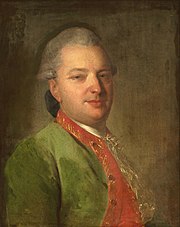Vasily Maykov
Vasily Maykov | |
|---|---|
 Portrait by Fyodor Rokotov, 1775 | |
| Born | Василий Иванович Майков 1728 |
| Died | 26 June 1778 Moscow, Russian Empire |
| Occupation(s) | poet, playwright, fabulist |
Vasily Ivanovich Maykov (Василий Иванович Майков, 1728, Yaroslavl, Russian Empire, - 28 June 1778, Moscow, Russian Empire) — was a Russian poet, fabulist, playwright and translator, an exponent of the mock-heroic poetry genre in Russia.[1]
As a playwright Maykov followed the tradition set by Alexander Sumarokov but, alongside heroic tragedies (Agriope, Агриопа, 1775) wrote some comedies too (The Country Holiday or a Rewarded Virtue, Деревенский праздник, или Увенчанная добродетель, 1777), occasionally mixing the two genres. As a lyrical poet he is said to have provided a link between the two eras in the Russian poetry, that of Mikhail Lomonosov on the one hand and Gavriil Derzhavin, on another. What Maykov really excelled at, though, was ironic verse, and it was the comedy The Ombre Player (Игрок ломбера) that made him famous in 1763.
The Works by V.I.Maykov were first compiled in 1809, to be revised and re-issued by Pyotr Yefremov in 1867. In the USSR The Selected Works by V.I. Maykov were published in 1966 by Sovetsky Pisatel.[2][3]
References
- ^ Stennik, Y.V. Майков Василий Иванович Russian Writers of the 18th Century. Biographical dictionary // Словарь русских писателей XVIII века / Vol. 2 (К-П). Saint Petersburg. Nauka Publishers, 1999
- ^ Избранные произведения. — М. — Л.: Советский писатель, 1966.
- ^ Timofeev, L.I. Майков В. И. in the Soviet Literary Encyclopedia in 11 Volumes. Vol. 6, 1932. Pp. 700-701 // Литературная энциклопедия: В 11 т. — [М.], 1929—1939. Т. 6. «Сов. Энцикл.», 1932. — Стр. 700—701.
- People from Yaroslavl
- 1728 births
- 1778 deaths
- Imperial Russian dramatists and playwrights
- Imperial Russian poets
- Imperial Russian male writers
- 18th-century Russian writers
- Russian male poets
- 18th-century Russian poets
- 18th-century dramatists and playwrights
- Russian male dramatists and playwrights
- Russian Freemasons
- Russian poet stubs
